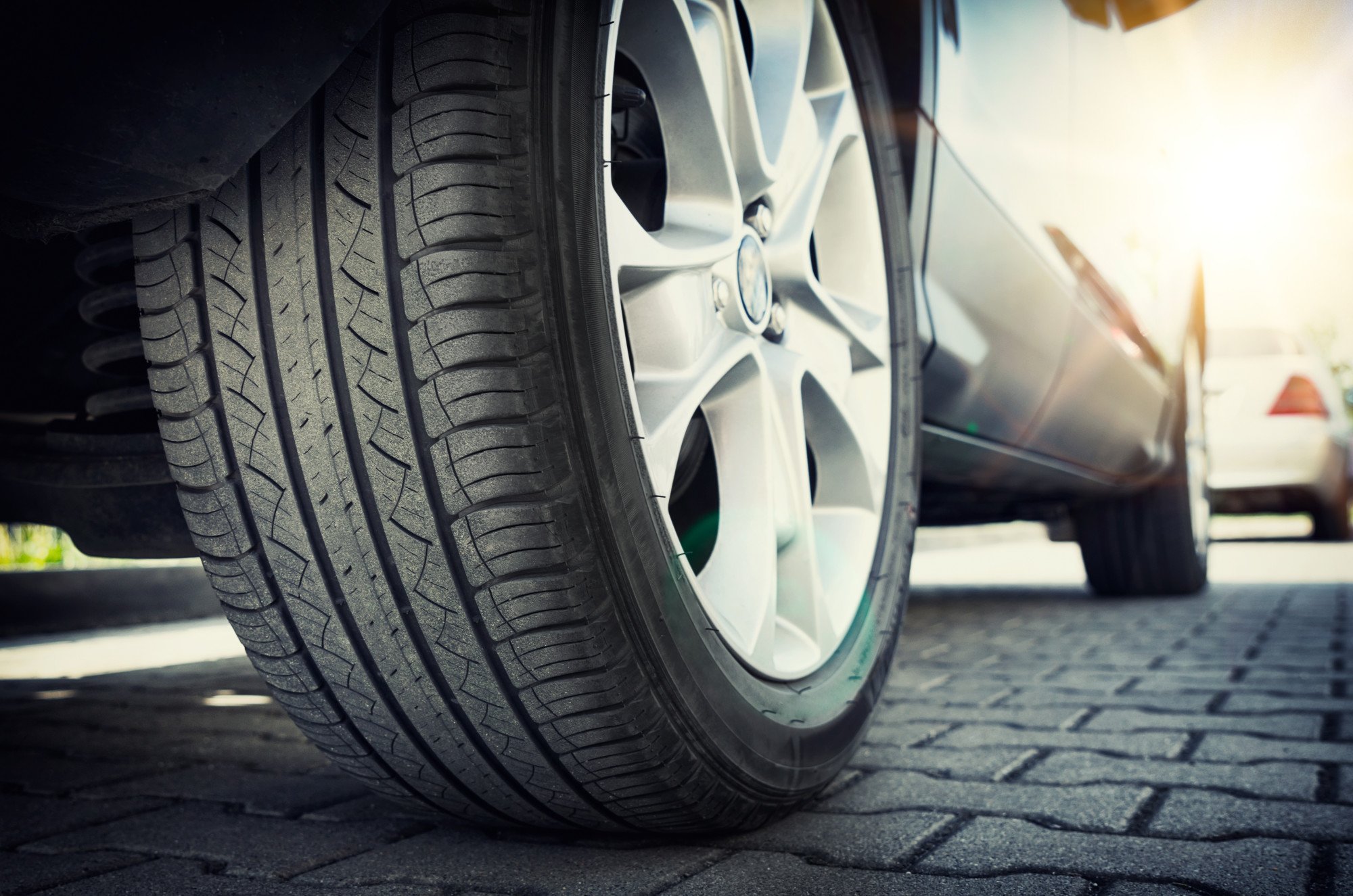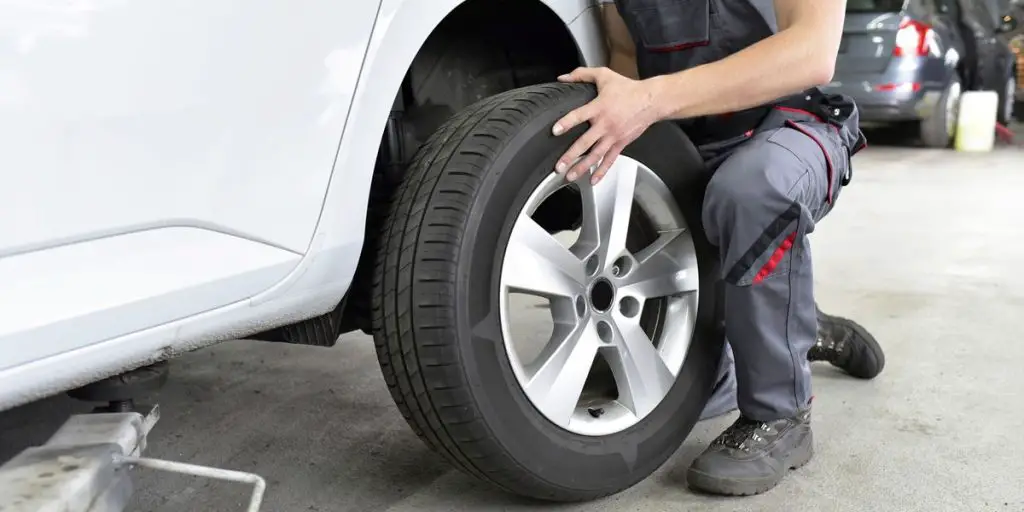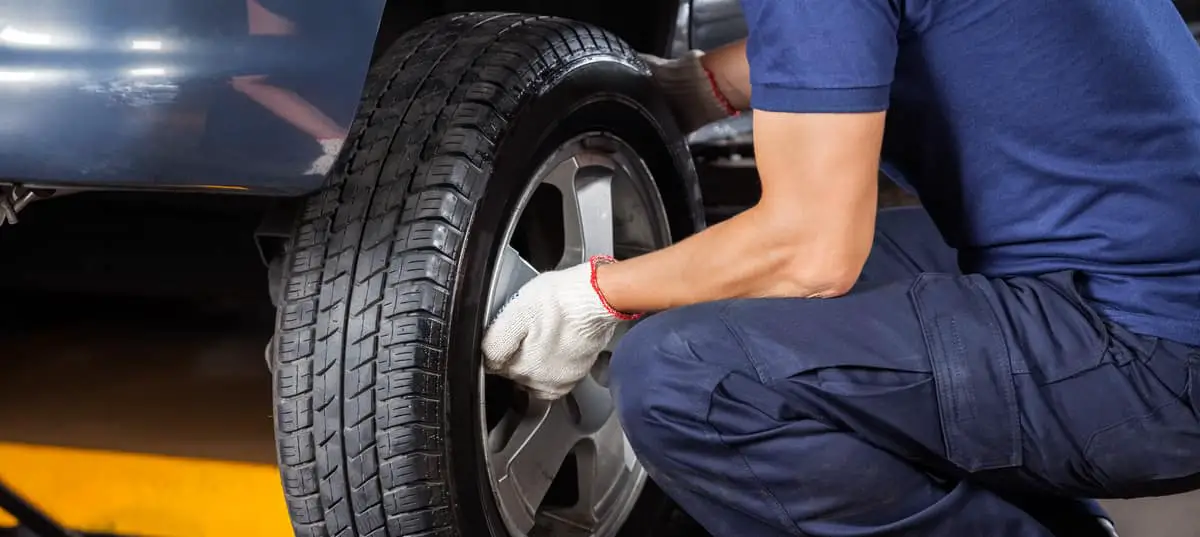Are There Tricks To Make My Tires Last Longer
There are some ways to ensure your tires last as long as possible, such as keeping them inflated to the proper pressure. You can find that number on your driver’s side door pillar, Montoya says.
Rotating your tires also extends their life, he says. “Tires are going to wear based on how you drive, and each one is going to wear in its own pattern, so rotating them makes sure that they are wearing evenly.”
Between five and six years is a good point where you need to start looking at replacing tires.Ronald Montoyasenior consumer advice editor at Edmunds
You should rotate your tires every 5,000 miles. The average person drives almost 13,500 miles per year, according to the Federal Highway Administration, so rotating them about twice a year should be adequate.
A good rule of thumb is to just get a tire rotation done when you bring your car to a mechanic to get the oil changed, Montoya says. It should cost roughly $100, he adds, but there are ways to save.
“Rotating tires should be free if you go to the shop that installed your tires,” Reiss says. “If that isn’t an option, rotating and balancing tires can cost from $25 to $100 depending on the shop and their rate for labor. But ask for a discount or for a free service. Many will do this in order to get your next tire purchase.”
Rotating tires should be free if you go to the shop that installed your tires.Scotty ReissA Girls Guide to Cars
Get Your Tyres Checked
It is imperative that the tread, pressure and general wear and tear of your tyres are checked regularly to make sure they are safe for use. We can examine these for you at our dealership in Leicester. Visit the servicing section of our website to learn more about checking your tyres or to book an appointment with the team.
Do Suv Tyres Last Longer Than Passenger Tyres
Answer: It varies.
SUV tyres are larger and tend to be capable of carrying a higher load limit than passenger car tyres, so it’s difficult to compare the lifespan between the two. It’s worth considering other factors such as the ones listed above before considering whether you should replace your tyres simply because of what type of car you use.
Generally, because SUVs tend to carry more weight than passenger cars, it’s worth getting them checked every year and be prepared to replace them every 50,000 – 75,000 KMs, or every 5 years, whichever comes first.
You May Like: What’s The Fastest Car In Forza Horizon 3
Based On Tire Performance
Tires are your cars principal point of contact with the road. Considering how rough and ripply our roads are, then, our tires take quite a beating. They can get out of balance, and as they get older, they ride rougher. Since this happens slowly over a long period of time, we forget how smoothly new tires ride. If youre the kind of motorist that values a smooth ride, you should regularly check the balance of your tires.
But sometimes an old tire, even if it has plenty of tread left, and even if its well within the five-year efficacy period, just cannot be balanced anymore. If you cannot fix a bad vibration despite balancing and having eliminated all other possible problems in the wheel and suspension, you just might have to change out to a new tire.
All in all, just be mindful of your tires. Have them checked regularly and balanced at a reputable tire shop. Also, check out our tip sheet on how to make the most out of a new set of tires.
Its Probably Time To Change Your Tires

All car owners need to be on top of replacing their tires. How often should you replace your tires? It might vary from person to person, but there are standards in place to determine tire health. Is your car due for a tire replacement? Then check out Christians Tire Shop. We have all the name brands you could possibly want, right here in Albuquerque.
Don’t Miss: How Much Freon Does My Car Need
Punctures In The Sidewall
If a nail is embedded in your tire but not in the tread area, youll need to replace the tire. Strong composite cords make up the tread structure, but the sidewall doesnt have the same cords. A plug cant fill a hole in the sidewall, since this part of the tire flexes so much while absorbing shock. The patch wont hold, and the tire will continue to leak or cause the tire to have a dramatic failure and blowout.
How Often Should You Rotate Your Tires
A good rule of thumb is to rotate your tires every 7,500 miles. However, rotation frequency may depend on factors such as the make and model of your car, how much you drive and even the weather.
If you live in a particularly harsh climate or do a lot of off-roading, you may need to rotate your tires more often. Consult your carâs ownerâs manual or speak with a trusted mechanic for more specific guidance.
Recommended Reading: Transfer Title Az
The Cr Testing Difference
Consumer Reports tests more than 40 tire models every yearfor cars, SUVs, and trucksputting them through their paces in up to 12 tests, mostly on our test track in Connecticut.
Some of these tests tell us how well tires grip, brake, and handle how they perform on snowy or wet roads and how resistant they are to rolling, which affects fuel mileage.
We also evaluate tread life by driving thousands of miles on a road course in western Texas and use that information, along with the price we paid for the tire, to estimate the cost per 100 miles.
The cheapest tire isnt always the best value. A significant factor in getting a good idea of the true cost over a tires life span is how long it will last before wearing out.
If it’s time to replace your tires, check our extensive tire ratings before you buy.
How Often Should You Replace Your Tires
Unfortunately, tires dont have set replacement schedules like air filters or motor oil. Instead, their longevity depends on a combination of how fast they wear out, how many miles theyve traveled and how old they are. Its important to consider all three when determining when to replace your tires.
Read Also: Average Car Salesman Commission Percentage
When Should You Replace Your Vehicles Tires
As a general rule, the National Highway Traffic Safety Administration recommends that drivers change the tires on their vehicles every six years. However, there are several factors that can place additional wear and tear on tires that force drivers to change them more frequently. If you drive more aggressively by braking and accelerating harshly, your tires will wear much faster than if you were to drive more responsibly. Additionally, if you are frequently driving on poorly maintained roads, your tires could endure more wear and tear as well. Lets explore a few ways to help your tires last for those six years!
How To Tell If Its Time To Replace Tires On Your Car
Tires dont last forever, and changing them restores performance and safety. Some people might replace tires too often, while others dont do it often enough. According to the National Highway Traffic Safety Administrations , only 19 percent of people check and adjust tire pressure properly, and roughly 700 people die in tire-related car crashes annually! Clearly, tires and tire maintenance are more important than many realize.
Tire maintenance will help your tires last as long as possible. The NHTSA recommends rotating your tires every 5,000 to 8,000 miles. This evens out wear patterns from the front and the rear that can be caused by steering and trailing axle differences, as well as torque distribution. Second, check and adjust your tires pressure at least once a month, and more often if possible. Finally, consider getting a wheel alignment done every year, as misaligned tires wear abnormally.
Rotating and checking your tires pressure only requires basic skills and tools. To rotate your cars tires, use a jack, jack stands, a breaker bar, a torque wrench and a deep socket. To check and adjust tire pressure, use a tire gauge and a tire inflator. It should be checked when the tires are cold, or stationary for at least three hours. If you dont want to go the DIY route, some tire installers offer complementary rotations after you get replacements, and some shops might check and adjust tire pressure for free.
Don’t Miss: Car Rental Discounts For Aarp Members
Q: How Often Should You Change Your Tires
How often you change your tires depends on a number of factors including what sort of car you own, where and how you drive it, and how well you care for your tires. Responsible drivers should be aware of the basics about tire wear, how to test for wear, and know how to decide when they should change their tires.
Tires are constructed with a pattern of grooves and ridges on their surfaces, which is referred to as tread. Tread increases a car’s traction on the road and diverts water from beneath the tire in wet conditions. Although tires are designed to provide reasonably consistent performance throughout their lifetimes, tread does wear down over time and gradually becomes less effective.
The nature of the compound that particular tires are constructed of largely determines whether one tire will wear down more quickly than another. Tires made of softer compounds provide greater responsiveness and braking performance, but they also wear down quicker. Most tires are considered to have a life of between 25,000 and 50,000 miles before they need to be replaced. However, these numbers are only averages. A car owner’s manual can include specific recommendations regarding how often and in what manner tires should be replaced for a particular model of car.
What Can You Do To Make Your Tires Last Longer

There are three main tips that you should bear in mind to prolong your tires life span:
- Regularly conduct car maintenance at a professional car repair shop
- Rotate your car tires after 6,000 or 8,000 miles
- Investigate the tires alignment at least twice a year
- Carefully inspect your car treadwear when necessary
Read Also: Removing Scuff Marks From Car Interior
Is It Safe Replacing Only One Tire
If possible, replace two or all tires at once. If you have to replace one tire, ensure the other tears have adequate tread to avoid affecting performance.
Wrap up!
Ensure you replace your car tires when the treads are worn out to avoid accidents due to blowouts and loss of car control. Also, avoid replacing one tire, instead replace all tires at once. With that, your car will serve you for many years.
Your Maintenance Habits Matter
Ultimately, the answer to the question, how long do tires last, depends on your maintenance habits. Tires need regular rotations to ensure that the tread wears evenly across each tire.
If you dont rotate them every few thousand miles, you risk uneven wear. This can decrease your cars fuel economy and may even put your safety at risk while youre behind the wheel.
You should also check the air pressure in each tire once a week at a minimum. Driving on underinflated tires increases the wear and tear they experience and shortens their lifespan.
Also Check: Does Walmart Make Car Keys With Chips
When And How Often To Replace Your Tires
Many or all of the products featured here are from our partners who compensate us. This may influence which products we write about and where and how the product appears on a page. However, this does not influence our evaluations. Our opinions are our own. Here is a list ofour partnersandhere’s how we make money.
Your tires look fine but, then again, theyve been on your car a long time. So you might have the nagging thought: When should I change my tires?
In addition to a blowout or a flat, there are two factors that will help you determine when you should replace your tires: tread depth and manufacture date.
When the tread is worn down, tires lose traction during braking and wont grip the road well when driving in the rain, ice and snow. But even if theres plenty of tread left, tires should be replaced if theyre too old, at least every six years. That’s because over time, the rubber will dry and crack, possibly leading to a blowout or flat tire.
Well tell you how to check your tread depth to find out if your tires are still safe and how to determine when your tires were manufactured to see if its within the time period recommended by experts.
Heres a quick look read on for the details:
|
Replace your tires |
How to tell its time |
|---|---|
|
When tread depth is too low |
Use the quarter and penny tests |
|
At least every six years |
Check the manufacture date on tire wall |
Do Front Tyres Wear Quicker
If a car is front wheel drive then the fronts will wear out a lot quicker than the rear ones, the rear tyres can do twice as many miles to the front. If your car is rear wheel drive, then the rears will wear a little faster although there isnt a lot of difference from front to back with these cars.
Don’t Miss: How To Hook Up Car Amp In House
Things To Remember When Youre Replacing A Tire
If one or more of your tires needs to be replaced, there are three more factors to consider:
- Whether to replace other tires at the same time
- Whether to get an alignment
- How to drive with your new tire
In general, its advisable to replace tires in pairs unless the other tire is fairly new and the replacement is because of unusual damage. Its also a very bad idea to have mismatched tires from side to side, as the different handling characteristics can be dangerous in an emergency.
- Tip: If youre replacing two tires and your car uses the same size tire on the front and the rear then its best to put the new tires in the front of a front wheel drive car and in the rear of a rear wheel drive car.
Its best to have your wheels aligned when you replace tires, unless:
- Its been less than two years since your last alignment
- Your old tires didnt show any unusual wear patterns
- You havent been in any accidents or hit any bumps very hard since your last alignment
-
Youre not changing anything else
-
Warning: If you get one or more tires replaced please remember that new tires are sometimes coated with substances that make them slick for a little while drive particularly carefully for the first 50 or 100 miles.
Things You Can Do To Increase Tire Lifespan
To get the most out of your tires, you need to maintain them properly.
You May Like: How To Paint Car Interior
Can I Change One Tyre Only
In a situation where the other tires have most of their tread still on them, it is usually okay to just replace one tire as long as its the exact same brand and model of tire. If your front tires have the same tread depth across and around then you have two possabilities: Youre driving a front wheel drive vehicle.
Determine The Style You Need

You rely upon your tires to allow you and your passengers to travel safely. In order for them to do their job effectively, there are multiple style options depending on your vehicle type, the kind of driving you do and the conditions youre likely to encounter.
Car and CUV tires
Passenger: These tires are designed and built for a broad range of cars and SUVs. They provide a very smooth and quiet ride and a long tread life. When maintained correctly, some brands will provide 60,000 miles of service. These tires will fit most of your needs, although all-season tires may be better for you.
Summer tires: Performance-oriented summer tires will work in dry and wet conditions. Summer tires are at their best in warm weather and are not all-season, meaning you may lose some traction in lower temperatures, even if the tire is in otherwise good condition. Their design is optimized for summer grip and handling.
Touring/all-season tires: All-season tires are designed to provide all-around comfort and handling in all seasons. Although not a snow tire, all-season treads work well in dry and wet weather. Passenger cars and many SUVs come standard with these types of tires.
Performance tires: High-performance tires have lower aspect ratios, higher speed ratings, larger grooves and a softer tire compound for better grip. These tires will, however, wear more quickly because of the softer compound.
Truck and SUV tires
Don’t Miss: How To Measure Car Speakers Size
